The Pregnancy over 40 Guide: Discover All You Need to Have a Happy, Healthy Nine Months Even Over 40
OVERCOMING MISCARRIAGES AND OTHER COMPLICATIONS TILL SAFE DELIVERY
In people who can get pregnant, the peak reproductive years span the time between your late teens and late 20s. Your fertility will begin to go down around age 30. This process continues more quickly starting in your mid-30s.
This condition can put you at a higher risk for preeclampsia, which is when you suddenly develop high blood pressure and signs of organ damage while pregnant. If doctors don't treat this, it can lead to serious or fatal problems for you and your baby. But later-in-life pregnancies can also affect the health of your baby, even if you don't have any health conditions. If you get pregnant at 40, you'll have a higher risk of: One study found that the risk of macrosomia (or a higher birth weight of your baby) goes up with age. Placenta previa, this happens when your baby's placenta either partly or completely covers your cervix, which is the exit area of your uterus. With this condition, you may bleed more while pregnant and during your delivery. You may: Have a more established career that allows you to have more time to raise a child, have a better financial status at an older age, want to have a child with a partner you met later in life, find that you're more mature and ready to handle the responsibility of a child. Want to know more? Grab a Copy of This Book NowFormat:Paperback
Language:English
ISBN:B0BFV6HRW4
ISBN13:9798353212577
Release Date:September 2022
Publisher:Independently Published
Length:96 Pages
Weight:0.27 lbs.
Dimensions:0.2" x 5.5" x 8.5"
Customer Reviews
0 rating





